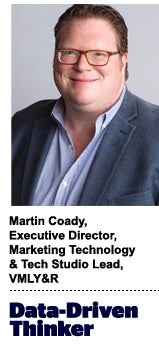“Data-Driven Thinking” is written by members of the media community and contains fresh ideas on the digital revolution in media.
Today’s column is written by Martin Coady, executive director of marketing technology and Tech Studio lead at VMLY&R.
Companies like Apple, Google, Amazon, Facebook and Microsoft pervade almost every aspect of our lives as consumers. And they dominate marketers’ worlds, too. If you add in their strategic partners (primarily Adobe and Salesforce) to round out their marketing technology capabilities, brands are awash in the outsized influence of these tech powers.
The big question is: Have brands become too dependent?
You can outsource a surprising amount of your operations to Big Tech. But that comes with a range of costs and risks that are important to weigh against the benefits and opportunities.
A higher ante on brand safety
The more closely you align with a strategic technology partner, the greater your risk of facing backlash from any ethical scrutiny they face.
Ethical issues have historically centered on ads appearing alongside questionable or sensitive content. But now it may be the behavior of the tech companies themselves that plays a role – be it how they treat customers, partners or employees.
Under this more expansive view, brand safety strategies that mitigate negative impact are essential considerations.
If your competitive advantage relies heavily on the execution and innovation of Big Tech companies, then your success depends on them, too. Regulation resulting from unresolved ethical behavior could disrupt their model. Poor employee experience could hinder their ability to find and retain talent.
While these may seem like unlikely scenarios at first, consider the rapid pace of the industry. Between growing customer expectations and quickly evolving technology, if a Big Tech player makes one wrong move, you may be facing more significant obstacles than you anticipate.
Inherited bias
In addition to any of Big Tech’s unethical practices reflecting poorly on your brand, an overreliance on their services could create ethical issues internally as well.
For example, you may be inheriting bias from Big Tech that undermines your DEI efforts. Nearly 70% of US businesses report a lack of diversity in their tech workforce. It’s becoming more apparent that this lack of diversity shows up in the data that businesses use and the systems they build.
Blind reliance on partners may undermine your ethical positions and efforts in this space.
To reduce the risk, take back the wheel
One of the most effective ways to mitigate ethical risks is by diversifying your partnerships, bringing technologists in-house or even building technology on your own.
Get back in the driver’s seat by following these key steps:
- Define your positions on critical topics. State them publicly to differentiate your values if questions around your tech partners’ ethics ever arise.
- Evaluate any new potential partners on their ethics and values. Don’t work with partners whose views or actions you don’t support.
- Learn from tech partners practicing good ethics. Follow Google’s suit and hire people without college degrees to increase diversity. Support them by offering an online training curriculum. Or borrow a page from Salesforce’s playbook and provide free online training and badging to grow hiring efforts.
- Encourage open discussion about ethics. Be transparent about goals and outcomes.
Ethics aren’t static
Just as technology is constantly changing, our conversation about its ethical implications needs regular reexamining.
Mike Schur, creator of The Good Place, put it this way:
“The show began without taking a position [on ethics], in part because I didn’t have a position,” Schur said. “Over time, that’s changed, and the show has really moved toward Aristotle. And that’s because Aristotle, in my mind, is the only one who says that it’s possible to make an attempt. He’s the one who says it’s like playing the flute – the more you practice, the better you get. And personally, I love that idea.”
I do, too.
Follow VMLY&R (@VMLYR) and AdExchanger (@adexchanger) on Twitter.













